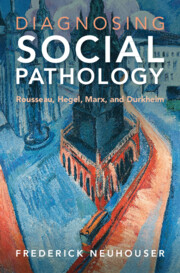Book contents
- Diagnosing Social Pathology
- Diagnosing Social Pathology
- Copyright page
- Dedication
- Contents
- Preface
- Note on Citations
- Chapter 1 Can Societies Be Ill?
- Chapter 2 Society as Organism?
- Chapter 3 Marx: Pathologies of Capitalist Society
- Chapter 4 Marx: Labor in Spiritual Life and Social Pathology
- Chapter 5 Plato: Human Society as Organism
- Chapter 6 Rousseau: Human Society as Artificial
- Chapter 7 Durkheim’s Predecessors: Comte and Spencer
- Chapter 8 Durkheim: Functionalism
- Chapter 9 Durkheim: Solidarity, Moral Facts, and Social Pathology
- Chapter 10 Durkheim: A Science of Morality
- Chapter 11 Hegelian Social Ontology I: Objective Spirit
- Chapter 12 Hegelian Social Ontology II: The Living Good
- Chapter 13 Hegelian Social Pathology
- Chapter 14 Conclusion: On Social Ontology
- Bibliography
- Index
Chapter 9 - Durkheim: Solidarity, Moral Facts, and Social Pathology
Published online by Cambridge University Press: 07 October 2022
- Diagnosing Social Pathology
- Diagnosing Social Pathology
- Copyright page
- Dedication
- Contents
- Preface
- Note on Citations
- Chapter 1 Can Societies Be Ill?
- Chapter 2 Society as Organism?
- Chapter 3 Marx: Pathologies of Capitalist Society
- Chapter 4 Marx: Labor in Spiritual Life and Social Pathology
- Chapter 5 Plato: Human Society as Organism
- Chapter 6 Rousseau: Human Society as Artificial
- Chapter 7 Durkheim’s Predecessors: Comte and Spencer
- Chapter 8 Durkheim: Functionalism
- Chapter 9 Durkheim: Solidarity, Moral Facts, and Social Pathology
- Chapter 10 Durkheim: A Science of Morality
- Chapter 11 Hegelian Social Ontology I: Objective Spirit
- Chapter 12 Hegelian Social Ontology II: The Living Good
- Chapter 13 Hegelian Social Pathology
- Chapter 14 Conclusion: On Social Ontology
- Bibliography
- Index
Summary
Chapter 9 explains Durkheim's understanding of moral facts and the conception of social solidarity at the core of his account of the division of labor's function in organized societies: crucial to what holds societies together and enables them to live are moral facts that inform relations among social members. Durkheim views human society as normatively constituted – governed by rules accepted as authoritative by social members – and claims that social institutions serve moral and not merely "useful" social functions. The chapter articulates the resources Durkheim has for conceiving of social pathology (itself an ethical phenomenon), examines the modern pathology most important to him, anomie, and coins a term for a related social pathology, hypernomie, a condition in which social rules are excessively rigid or constraining. Finally, the chapter reconstructs Durkheim's understanding of what is bad about social pathology – why social members should care whether their society is ill.
Keywords
- Type
- Chapter
- Information
- Diagnosing Social PathologyRousseau, Hegel, Marx, and Durkheim, pp. 192 - 228Publisher: Cambridge University PressPrint publication year: 2022

